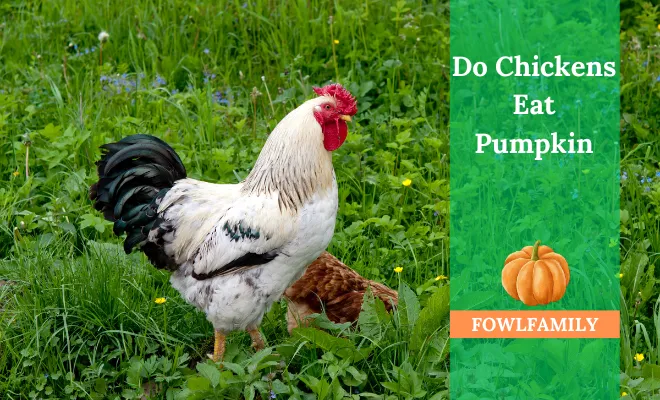Do Chickens Eat Pumpkin? Yes, Flocks Get 6 Notable Benefits!

For chickens, pumpkins come with plenty of nutrients. But knowing whether or not pumpkin is safe for chickens is the question here.
So, can chickens eat pumpkins? Certainly! Chickens can benefit from eating pumpkin in moderation. The vitamins, minerals, and fiber in pumpkin can support chicken health. Just avoid overfeeding, and pumpkin is all set to be one of the most nutritious foods for them.
This article explores if and how much pumpkin chickens can eat safely. Also, the benefits, drawbacks, and nutritional profile will all be here. Read this article for very data-driven insights.
Table of Contents
Do Chickens Eat Pumpkin? Is It Healthy?

Yes, chickens can eat pumpkins. Both the flesh and seeds of pumpkins are healthy treats for chickens. Pumpkins provide nutrients like vitamin A, potassium, and beta-carotene.
These supplements support vision, egg production, and immune function. However, too much pumpkin can cause loose droppings, so knowing the ideal quantity is important.
Can Baby Chickens Eat Pumpkins?

No, baby chicks shouldn’t eat pumpkins in their initial days. However, they can eat mashed pumpkin once they are at least 2 weeks old.
The pumpkin will help supplement the nutrients that your chicks need to grow big and strong. Make sure bits of pumpkin flesh and seeds are small enough not to choke the chicks.
What If I Feed Chickens Pumpkin Every Day?
Feeding a whole pumpkin daily would provide too much rich nutrition. It may cause digestive upset with loose, smelly droppings. For variety, supplement their diet with other fruits and vegetables too.
This video will explain why pumpkins are beneficial for your chickens:
Can Chickens Eat Different Pumpkin Parts?
Anyway, let’s go a little deeper into the topic. Can chickens eat all parts of a pumpkin? Heré’s the answer one by one.
Can Chickens Eat Pumpkin Skin?
Yes. Chicken can eat the outer skin and other parts of the pumpkin. It contains fiber and nutrients. Just monitor your birds to ensure the skin does not cause crop impaction.
Can Chickens Eat Pumpkin Guts?
The stringy pulp and seeds inside a pumpkin are edible for chickens. The guts provide protein from the seeds as well as moisture and fiber. This part of the pumpkin offers great nutritional value.
Can Chickens Eat Pumpkin Vines?
Chickens should not eat pumpkin vines or leaves. These parts sometimes contain alkaloids and glycosides toxic to poultry. Stick just to feed chickens the inside pulp and inner seeds.
Can Chickens Eat Pumpkin Seeds?
Yes. The seeds in pumpkin contain healthy fats, protein, and other nutrients that benefit chickens. They are a great supplement to their regular feed.
Do Chickens Eat All Forms of Pumpkin?
Pumpkins are just too good for chickens, regardless of the form they are in. Let’s check which form is edible and if there are any precautions to follow while feeding such pumpkins.
Can Chickens Eat Raw Pumpkins?

Chickens can eat raw pumpkin flesh. Raw pumpkin provides more active enzymes and vitamins that are not damaged by cooking. Make sure the raw pumpkin is fresh, and the flesh is soft enough for chickens to digest.
Can Chickens Eat Cooked Pumpkins?
Cooked or baked pumpkin is safe for chickens, too. In fact, cooking softens the pumpkin, which makes it easier to chew and digest. Cooked pumpkin may have diminished nutrition but still offers benefits.
Anyway, only boiled pumpkins without added salt and other spices are good.
Can Chickens Eat Pumpkin Puree?
Yes. Chicken can eat canned or homemade pumpkin puree. Pureeing breaks down fiber for digestibility and concentrates the nutrients. This makes an excellent supplemental feed.
Nutritional Profile of Pumpkin for Chickens
I shouted enough of pumpkin. Let’s take a look at the nutrients in 100 grams of raw pumpkins based on USDA.
| Nutrient | Amount | Unit |
|---|---|---|
| Water | 91.6 | g |
| Energy | 26 | kcal |
| Protein | 1 | g |
| Fiber | 0.5 | g |
| Potassium | 340 | mg |
| Vitamin C | 9 | mg |
| Calcium | 21 | mg |
| Iron | 0.8 | mg |
| Magnesium | 12 | mg |
5 Benefits of Feeding Pumpkins to Chickens
Pumpkin’s list of benefits is quite extended. Let’s have a look at the key ones below.

1. Boosts Egg Production
Pumpkin contains significant amounts of vitamin A precursor beta-carotene. Converting this carotenoid to vitamin A supports healthy reproductive systems and egg production in chickens.
The bright orange pigment also enriches the yolk color of eggs. Pumpkin can boost overall egg yields by promoting ovarian development and ovulation and enriching egg nutritional quality.
2. Supports Vision
The beta-carotene found in pumpkin serves as an essential building block for vitamin A. Vitamin A supports proper eye health and vision in chickens.
It enables better sight to find food scraps and detect aerial or land predators earlier. Better vision improves survival and reduces injuries.
3. Promotes Digestive Health
The flesh of pumpkins provides a rich source of fiber. Insoluble fiber adds bulk to food waste in the digestive tract, promoting regular digestion and waste elimination.
This may prevent digestive issues like crop impactions and constipation. The moisture in pumpkins can also help digestion by easing passage through the gut.
4. Provides Protein and Fiber
In addition to the fiber in the flesh, the seeds of pumpkins offer a concentrated dose of plant-based protein. Protein fuels growth and supports muscle maintenance. The seeds also provide insoluble fiber for digestion.
5. Supports Immunity
Pumpkin flesh and seeds provide vitamin A, vitamin C, zinc, and other antioxidants that bolster immune defenses in chickens. These components help combat illness-causing pathogens and free radicals. Supporting immune function is key to maintaining flock health.
5 Risks Associated With Feeding Pumpkins to Chickens
Overfeeding pumpkins will have a couple of consequences. Let’s check all these.
1. Digestive Upset
Too much pumpkin can overwhelm the digestive system of chickens. The high fiber and moisture content can cause irritated bowels, diarrhea, intestinal bloating, and smelly droppings when overfed.
Undigested pieces may get backed up and impact the crop or intestines. Digestive distress is uncomfortable for birds and can be dangerous if unchecked.
2. Reduced Nutrient Absorption
When digestive passages are blocked or distressed, chickens cannot properly absorb critical nutrients from their feed. Necessary protein, minerals, and vitamins pass straight through their systems unabsorbed.
Without adequate nutrition absorption, egg laying, growth, and immunity suffer.
3. Poor Egg Production
In addition to reduced feed nutrient absorption, excess beta-carotene from pumpkin overfeeding can negatively impact reproductive systems and egg production.
Too much vitamin A precursor without proper protein and mineral balance causes ovary and oviduct dysfunction. Overfeeding pumpkins may thus lead to a drop in eggs laid.
4. Weight Gain
Pumpkin serves up a heavy dose of carbohydrates and calories. While less energy-dense than chicken feed, overconsuming pumpkin provides excess energy beyond birds’ needs.
This leads to unnecessary weight gain, which stresses joint and bone health.
5. Calcium & Protein Deficiency
The vitamin A in beta-carotene interferes with adequate calcium absorption needed for bone health. Overdosing pumpkin thus leads to a higher risk of bone issues.
Lack of protein from digestive issues also causes problems. Without enough protein intake, muscle mass and egg production decline.
How Do You Serve Pumpkins to Chickens?
Well, serving pumpkins to chickens isn’t a tough job. Let’s know everything about serving pumpkins to ducks.
How Much to Offer?
Feed chickens about 1 cup of fresh pumpkin or pumpkin scraps per 4-5 birds once. Adjust amounts based on their appetite and reaction.
How Often Should I Feed Pumpkin to Chickens?
The pumpkin should be served as an occasional treat to supplement a complete feed ration. Feeding pumpkin to chickens 2-3 times per week is ideal for most backyard flocks.
Serving Tips
Need serving tips? Here’s my personalized suggestion for serving pumpkins to chickens.
- Choose a fresh, ripe pumpkin.
- Cut pumpkin and scoop out pulp and seeds.
- Chop pumpkin flesh into bite-sized cubes. To have a better idea of how small the pieces should be, you may see YouTube videos. Make it as small as you can.
- Mash or puree some of the pumpkins for younger chickens. It can be boiled as well.
- Clean out slimy strings and discard rinds.
- Now is the serving time. Place bite-sized pumpkin pieces into a large feeding tray.
- Use separate trays for mash/puree and for cubes.
Recommended Readings:
- Can Chickens Eat Green Beans
- Brussel Sprouts For Chickens
- Is Butternut Squash Good For Chickens
- Can Chickens Eat Eggplant
Summary of the Study
Pumpkins make a tasty, healthy treat for chickens. Feed your flock some cubed flesh or roasted seeds 2-3 times a week. The vitamins, fiber, and protein will supplement their diet and take care of their health.
Just be careful not to overfeed, as too much can cause digestive upset. Pumpkins in ideal quantity provide benefits without weight gain. This fall bounty supports egg production and chickens well-being from beaks to claws!






